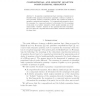Free Online Productivity Tools
i2Speak
i2Symbol
i2OCR
iTex2Img
iWeb2Print
iWeb2Shot
i2Type
iPdf2Split
iPdf2Merge
i2Bopomofo
i2Arabic
i2Style
i2Image
i2PDF
iLatex2Rtf
Sci2ools
115
click to vote
NC
2007
2007
Compositional and holistic quantum computational semantics
In quantum computational logic meanings of sentences are identified with quantum information quantities: systems of qubits or, more generally, mixtures of systems of qubits. We consider two kinds of quantum computational semantics: 1) a compositional semantics, where the meaning of a compound sentence is determined by the meanings of its parts; 2) a holistic semantics, which makes essential use of the characteristic “holistic” features of the quantum-theoretic formalism. We prove that the compositional and the holistic semantics characterize the same logic.
NC 2007 | Neural Networks | Quantum Computational Logic | Quantum Computational Semantics | Semantics |
| Added | 27 Dec 2010 |
| Updated | 27 Dec 2010 |
| Type | Journal |
| Year | 2007 |
| Where | NC |
| Authors | Maria Luisa Dalla Chiara, Roberto Giuntini, Roberto Leporini |
Comments (0)

